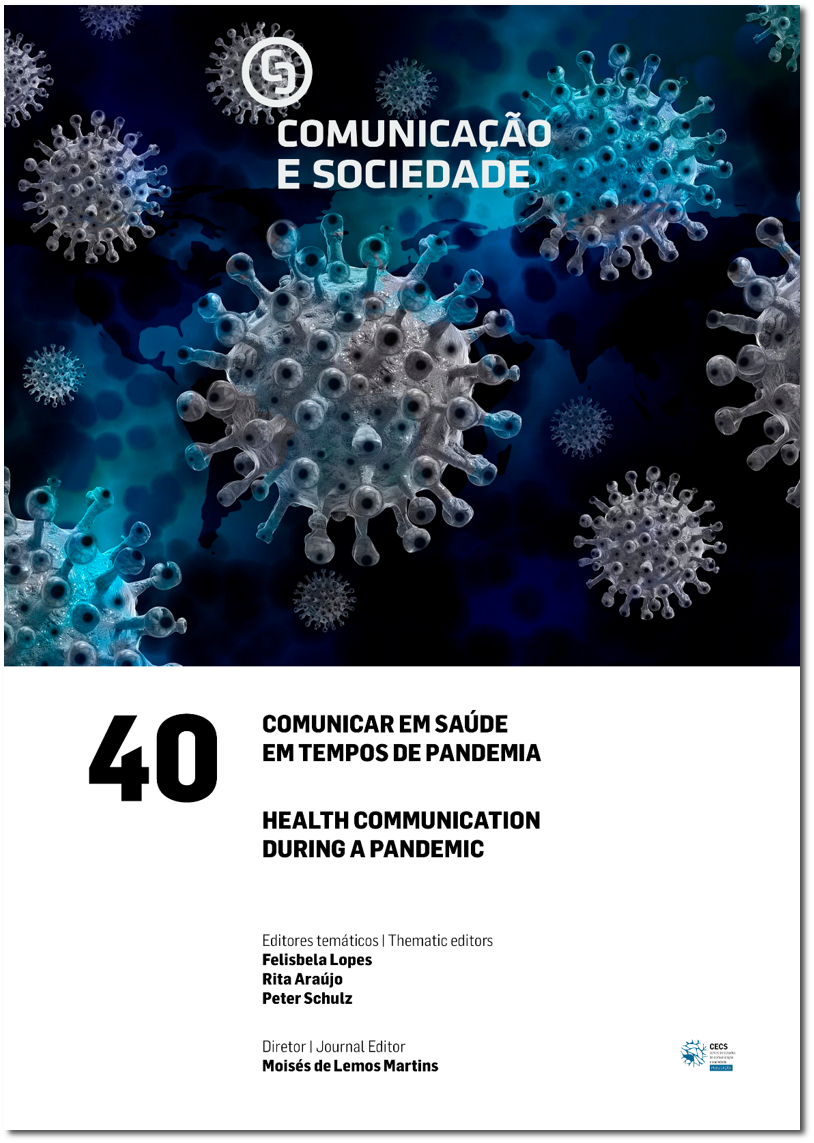Potentialities of Podcasting in Health Journalism — An Analysis of Three Podcasts About Covid-19 in Portugal
DOI:
https://doi.org/10.17231/comsoc.40(2021).3249Keywords:
health journalism, podcast, pandemic, covid-19, PortugalAbstract
The pandemic caused by covid-19 was a lever for the appearance of several podcasts dedicated to the disease. In several countries, including Portugal, the media added audio content to their traditional information offering by using this digital tool. The podcast’s popularity has grown with audiences, and media companies look to this platform as a good strategy to diversify content and thus reach audiences. In times of crisis, such as a pandemic, the need for populations to access credible information they can trust and thus gain knowledge to help them make decisions increases. In this particular case, covid-19, the populations felt the need to be informed about an unknown disease, looking for information about symptoms, contagion, or means of personal protection, and podcasts represented an answer to these information needs. This article examines how three Portuguese podcasts dedicated exclusively to covid-19 treated the disease. Based on the data, we will reflect on the importance of this new tool for health journalism. The results of the research allow us to conclude that the national podcasts on covid-19 analyzed follow some patterns identified in the coverage of health topics in Portugal and that, adopting an “advisory” tone, they placed themselves in the position of supporting tools in combat the pandemic by clarifying, informing and clarifying issues related to the disease.
Downloads
References
Azevedo, A. (2012). Jornalismo de saúde: Novos rumos, novas literacias. Comunicação e Sociedade [Vol. Especial], 185–197. https://doi.org/10.17231/comsoc.23(2012).1363
Balzen, R. (2017, 8 de dezembro). The podcast is the democratic medium. Discover Pods. https://discoverpods.com/podcasting-democratic-medium/
Berry, R. (2015). A golden age of podcasting? Evaluating serial in the context of podcast histories. Journal of Radio and Audio Media, 22(2), 170–178. https://doi.org/10.1080/19376529.2015.1083363
Bonini, T. (2015). The second age of podcasting: Reframing podcasting as a new digital mass medium. Quaderns del CAC, 18, 23–33. https://www.cac.cat/documentacio/la-radio-encara
Bonixe, L. (2006). O podcasting em Portugal: Características e formatos de uma comunidade emergente. In Atas do III Congresso online do Observatorio para la CiberSociedad. Observatorio de la Cibersociedad.
Cardoso, G., Baldi, V., Quintanilha, T. L., Paisana, M., & Pais, P. C. (2020). Impacto do coronavirus e da crise pandémica no sistema mediático português e global. Obercom. https://obercom.pt/wp-content/uploads/2020/04/Covid19_impacto_final.pdf
Hinnant, A., & Len-Rios, M. E. (2009). Tacit understandings of health literacy: Interview and survey research with health journalists. Science Communication, 31(1), 84–115. https://doi.org/10.1177/1075547009335345
Hodgetts, D. (2012). Civic journalism meets civic social science: Foregrounding social determinants in health coverage. Comunicação e Sociedade [Vol. Especial], 23–38. https://doi.org/10.17231/comsoc.23(2012).1352
Kischinhevsky, M., Lopez, D. L., & Benzecry, L. (2020). Podcasting tensiona categorizações e ganha, enfim, destaque como objeto de estudos. Radiofonias — Revista de Estudos em Mídia Sonora, 11(1), 6–12. https://periodicos.ufop.br/radiofonias/article/view/4333
Kline, D., & Burstein, D. (2005). A Mayhem of media possibilities – An interview with Adam Curry. In D. Kline & D. Burstein (Eds.), Blog! (pp. 270–278). CDS Books.
Kovach, B., & Rosenstiel, T. (2004). Os elementos do jornalismo. Porto Editora.
Levin-Zamir, D., & Bertsch, I. (2018). Media health literacy, ehealth literacy, and the role of the social environment in context. International Journal of Environmental Research and Public Health, 15, Artigo 1643. https://doi.org/10.3390/ijerph15081643
Lopes, F., & Fernandes, L. (2012). À procura de uma vibrante esfera pública da saúde através da análise da imprensa portuguesa. In S. Marinho, T. Ruão, F. Lopes, Z. Pinto-Coelho, & L. Fernandes (Eds.), Olhares cruzados sobre comunicação na saúde: Relatório de um debate (pp. 17–30). CECS. http://www.lasics.uminho.pt/ojs/index.php/cecs_ebooks/article/view/1459
Lopes, F., Ruão, T., & Marinho, S. (2010). Gripe A na imprensa portuguesa: Uma doença em notícia através de uma organizada estratégia de comunicação. Observatório (OBS*), 4(4), 139–156. https://doi.org/10.15847/obsOBS442010442.
Magalhães, O. E., Lopes, F., & Costa-Pereira, A. (2017). Qual o papel do jornalismo na literacia da saúde? – Estado da arte. In S. Pereira & M. Pinto (Eds.), Literacia, media e cidadania – Livro de atas do 4.º congresso (pp. 251–265). CECS. http://www.lasics.uminho.pt/ojs/index.php/cecs_ebooks/article/view/2679
Martins, R. (2020, 3 de junho). Podcasts em quarentena: uma moda passageira. MediaLab. https://medialab.iscte-iul.pt/podcasts-em-quarentena-uma-moda-passageira/
Newman, N. (2021). Journalism, media, and technology trends and predictions 2021. Reuters Institute. https://reutersinstitute.politics.ox.ac.uk/journalism-media-and-technology-trends-and-predictions-2021
Newman, N., Fletcher, R., Kalogeropoulos, A., & Nielsen, R.K. (2019). Reuters Institute digital news report 2019. Reuters Institute. https://reutersinstitute.politics.ox.ac.uk/our-research/digital-news-report-2019
Newman, N., & Gallo, N. (2020). Daily news podcasts: Building new habits in the shadow of coronavirus. Digital Reuters Institute. https://reutersinstitute.politics.ox.ac.uk/daily-news-podcasts-building-new-habits-shadow-coronavirus
Peters, H. P. (2000). A interação entre jornalistas e peritos científicos: Cooperação e conflito entre duas culturas profissionais. In N. Traquina (Ed.), Jornalismo 2000 (pp. 213–236). Relógio D’Água.
Reis, I. (2018). O áudio invisível: Uma análise ao podcast dos jornais portugueses. Revista Lusófona de Estudos Culturais, 5(1), 209–225. https://doi.org/10.21814/rlec.301
Schwitzer, G. (2009). The state of health journalism in the U.S. Kaiser Family Foundation. https://www.issuelab.org/resources/7693/7693.pdf
Downloads
Published
How to Cite
Issue
Section
License
Copyright (c) 2021 Luís Bonixe

This work is licensed under a Creative Commons Attribution-NonCommercial 4.0 International License.
Authors own the copyright, providing the journal with the right of first publication. The work is licensed under a Creative Commons Attribution 4.0 International License.











